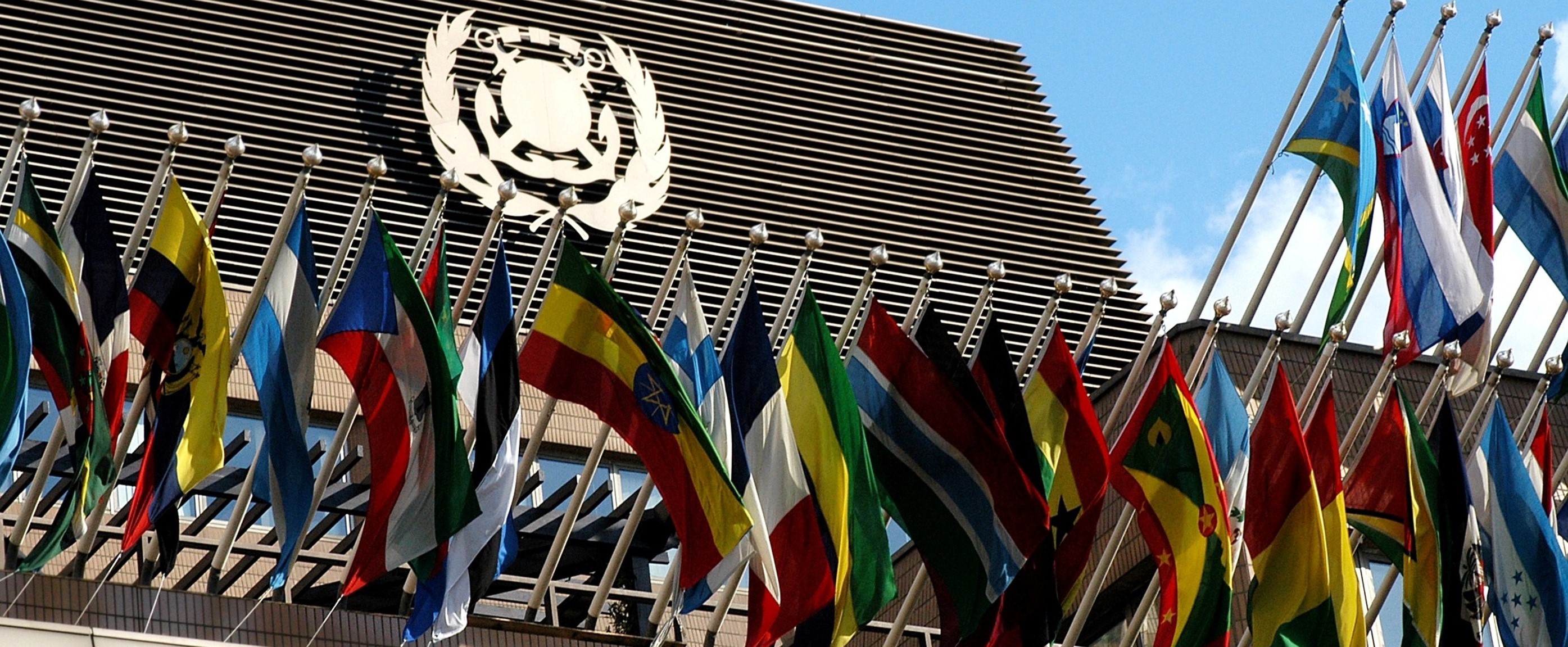2018 Initial IMO Strategy

On 13 April 2018, MEPC 72 adopted resolution MEPC.304(72) on the Initial IMO Strategy on reduction of GHG emissions from ships. This Initial Strategy defines the objectives, tools, pace of work and guiding principles to decarbonize shipping.
The "Vision" set out in the text of this Initial IMO Strategy confirms the Organization's commitment to reducing GHG emissions from international shipping and, as a matter of urgency, to phasing them out as soon as possible in this century.
The Initial IMO Strategy envisages for the first time a reduction in total GHG emissions from international shipping and identifies levels of ambition as follows:
- Carbon intensity of the ship to decline through implementation of further phases of the energy efficiency design index (EEDI) for new ships
To review with the aim to strengthen the energy efficiency design requirements for ships with the percentage improvement for each phase to be determined for each ship type, as appropriate; - Carbon intensity of international shipping to decline
To reduce CO2 emissions per transport work, as an average across international shipping, by at least 40% by 2030, pursuing efforts towards 70% by 2050, compared to 2008; and - GHG emissions from international shipping to peak and decline
To peak GHG emissions from international shipping as soon as possible and to reduce the total annual GHG emissions by at least 50% by 2050 compared to 2008 whilst pursuing efforts towards phasing them out as called for in the vision as a point on a pathway of CO2 emissions reduction consistent with the Paris Agreement temperature goals.
The Initial IMO Strategy represents a framework for further action, setting out the future vision for international shipping, the levels of ambition to reduce GHG emissions and guiding principles and identifies:
candidate short-term measures, to be agreed between 2018 and 2023, [such as further improvement of the EEDI and the SEEMP, the development of operational indicators for both new and existing ships, the establishment of an Existing Fleet Improvement Programme, the use of speed optimization and speed reduction, the development and update of national action plans, the enhancement of technical cooperation activities managed by IMO, ports developments (e.g. onshore power supply from renewable sources), incentives for first movers to develop and take up new technologies, etc.;]
candidate mid-term measures, to be agreed between 2023 and 2030, [such as the implementation programme for the effective uptake of alternative low-carbon and zero-carbon fuels or innovative emission reduction mechanisms to incentivize GHG emission reduction, including for example Market-based Measures;]
candidate long-term measures, which could be agreed beyond 2030[, such as pursuing the development and provision of zero-carbon or fossil-free fuels or encouraging and facilitating the adoption of other innovative emission reduction mechanisms].
The Initial Strategy also provides that the impacts on States of a measure should be assessed and taken into account as appropriate before adoption of a measure. The Strategy also identifies barriers and supportive measures including capacity building, technical cooperation and research and development (R&D).
Addressing representatives of IMO Member States and IMO staff on 4 May 2018, the UN Secretary-General Mr. António Guterres highlighted the important contribution of IMO's work towards achieving the United Nations Sustainable Development Goals (SDGs). He welcomed, in particular, the adoption by IMO of the Initial IMO Strategy on reduction of greenhouse gas emissions from ships, as a major step forward in global action to combat climate change.
Following this historic step, which sent a clear signal to the shipping industry as a whole to stimulate investment in the development of low-carbon and zero-carbon fuels and innovative energy efficient technologies, IMO Member States approved in October 2018 a Programme of follow-up actions of the Initial Strategy up to 2023.
Revision of the Strategy
From the time of its adoption in 2018, IMO Member States agreed to keep the Initial Strategy under review, with a view to adoption of a Revised IMO Strategy on reduction of GHG emissions from ships in 2023.
IMO's Marine Environment Protection Committee (MEPC) at its seventy-seventh session (MEPC 77) agreed to initiate the revision of the Initial Strategy, recognizing the need to strengthen the ambition during the revision process. The move came in the wake of the United Nations Climate Change Conference (COP 26), held in Glasgow, United Kingdom, (1-12 November 2021) and in view of the urgency for all sectors to accelerate their efforts to reduce GHG emissions. MEPC 77 agreed that a final draft Revised IMO GHG Strategy would be considered by MEPC 80 (scheduled to meet July 2023), with a view to adoption.
In June 2022, MEPC 78 reiterated its commitment to adopt a revised and strengthened IMO GHG Strategy by MEPC 80 (July 2023). The Committee had for its consideration a number of documents submitted by Member States and observer organizations providing concrete proposals and comments related to the revision of the Initial IMO GHG Strategy, including, inter alia, the level of ambition for 2050, intermediate GHG reduction targets, and how to ensure a "just and equitable" transition that addresses the interests of developing States, in particular SIDS and LDCs, often also the most climate vulnerable States.
In December 2022, MEPC 77 considered further proposals and reiterated its commitment to adopt a revised IMO GHG Strategy in all its elements, including with a strengthened level of ambition by MEPC 80.
On July 7 2023 MEPC 80 adopted the 2023 IMO Strategy on Reduction of GHG Emissions from Ships, with enhanced targets to tackle harmful emissions.
The revised IMO GHG Strategy includes an enhanced common ambition to reach net-zero GHG emissions from international shipping close to 2050, a commitment to ensure an uptake of alternative zero and near-zero GHG fuels by 2030, as well as indicative check-points for 2030 and 2040. Further details can be found here.